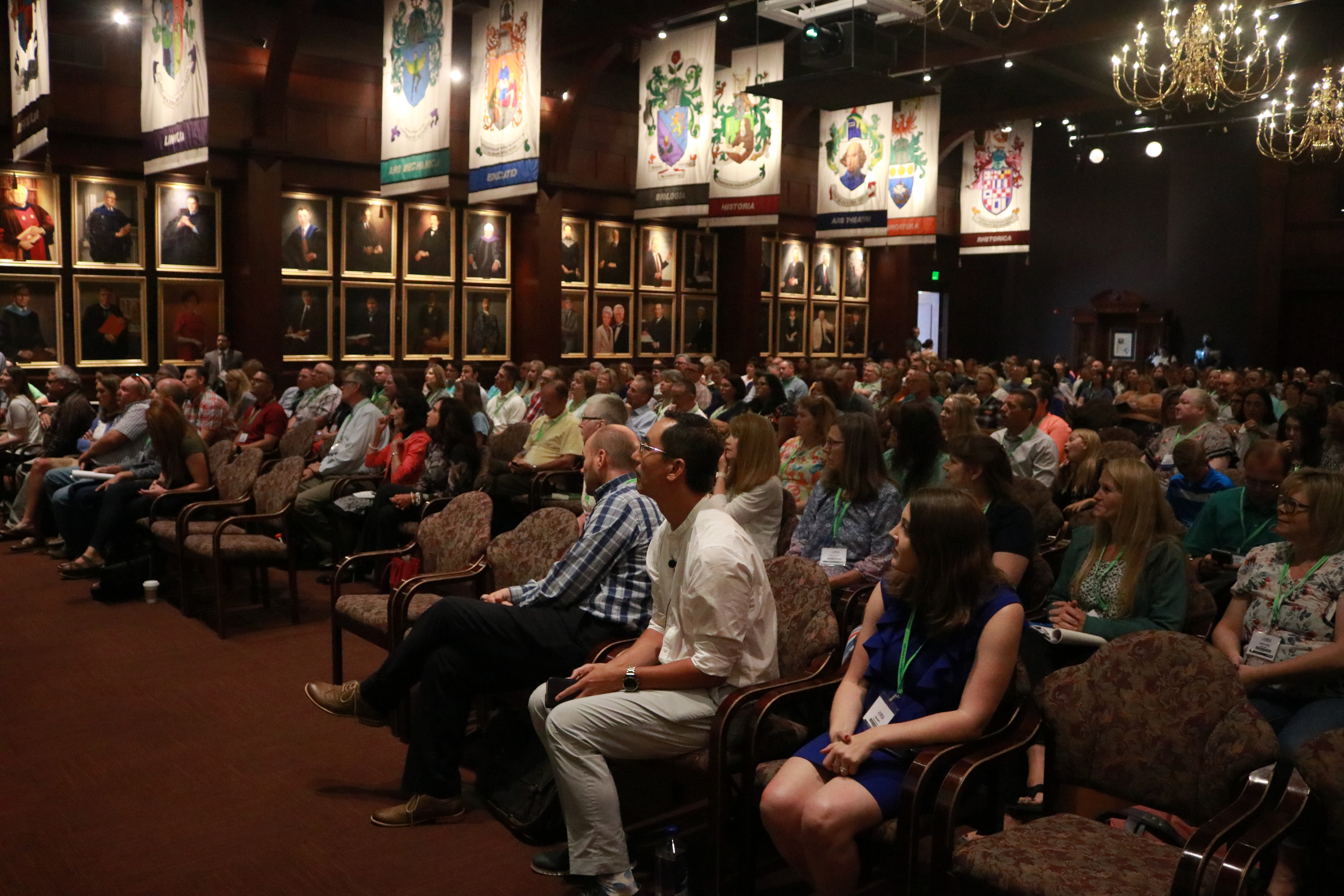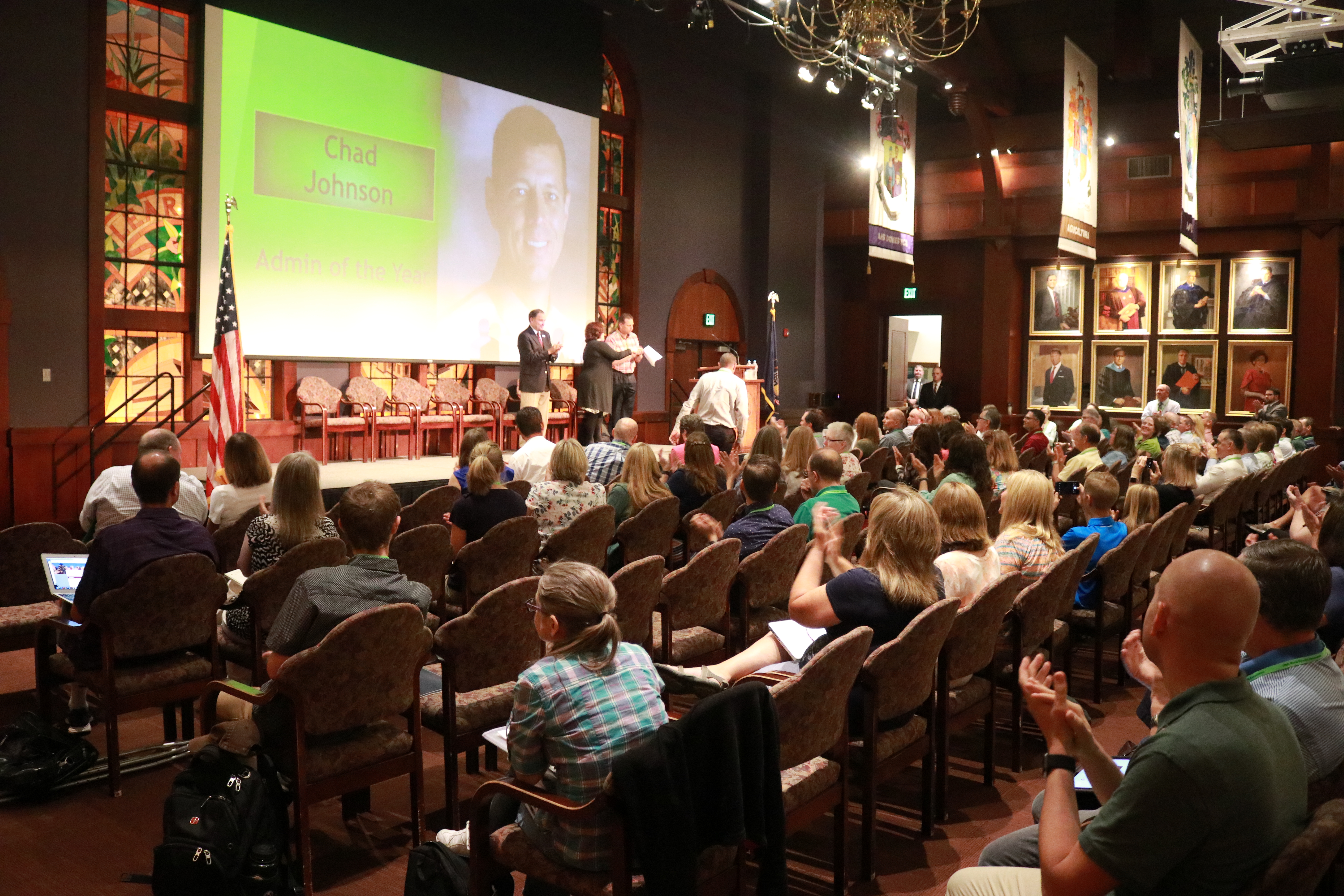
CEDAR CITY — When it comes to making Utah the best in the nation in regards to education, Gov. Gary Herbert said he hopes increased funding for schools and a focused 10-year plan will help push the state in that direction.

Herbert’s remarks came during last week’s annual summer “Utah Rural Schools Conference” at Southern Utah University. More than 500 educators and administrators attended the three-day event, organizers said.
Herbert cited a recent U.S. News and World Report ranking Utah’s education system as third best in the nation.
“It means we’ve moved from the middle of the pack to the top 10,” he said.
But Herbert said Utah is not stopping there; the new statewide goal is to become No. 1.
“It’s nice to be number three, but we want to be the best. I think we can actually do that,” he said. “We clearly need to have two things to happen. One, we need to get more money into the education system, and two, we need to get more return on the dollars we do put out. And the good news is, both of those things are happening.”
Herbert mentioned in particular the idea of raising the state gasoline tax by an additional 10 cents per gallon in order to indirectly increase education funding.
Although gas tax revenue is typically used for roads and highways, Herbert explained how the proposal could help provide more money for education.
“For a lot of people, the gasoline tax and education, that doesn’t compute,” he said. “Why are we raising gasoline tax in order to pay for education?”

Herbert went on to explain that the state gas tax, which hasn’t increased in 20 years, is not covering as much of the roads budget as it once did.
“With inflation rising, we just can’t buy as much with that amount of money as we did before,” he said. “We used to have 60 percent of the cost for roads and maintenance … coming from gasoline tax. Now only 40 percent comes from the gasoline tax, and 60 percent comes from the general fund, which means we have less money in that bucket to put into education.”
State lawmakers have agreed to place a question about the proposed 10-cent gas tax hike on the November general election ballot as a nonbinding referendum meant to gauge the level of public support for the idea.
Currently, the public seems to be evenly divided on the issue, Herbert said.
“I’m hopeful that this will pass and I think that it will help the legislature make the right decision,” he said.
“Nobody wants to raise taxes. That’s not something that we think is a fun thing to do, but having the appropriate balance in tax policy is an appropriate thing for us to do for economic success in the future, and to make sure that we have a labor force that is commensurate with the demands of the marketplace, and that means education.”
At the conclusion of the governor’s 25-minute speech, the conference attendees stood and applauded.
Sam Ray, superintendent of North Sanpete School District and president of the Utah Rural Schools Association, told Cedar City News that the educators seemed especially appreciative of Herbert’s remarks regarding increased funding and support for schools.
“If the gas tax passes, districts and schools will mostly increase funding for technology and other proven methods to improve student learning, increase teacher salaries and provide professional development,” Ray said. “Each school and district will tailor the funding to their needs.”
During his speech, Herbert also referred to a newly developed statewide educational roadmap created by the Governor’s Education Excellence Commission.

The roadmap is essentially a 10-year plan designed to articulate the state’s educational goals and priorities between 2018 and 2027. Printed copies of the 22-page document were handed out at the conference. For an electronic copy, click here.
Herbert said the roadmap was created to help leaders maintain focus in a more unified way, versus the “scattershot” approach that often occurs in the Utah Legislature.
“One year, I think we had like 150 different bills introduced on education,” Herbert said.
Herbert said the roadmap is designed to give state leaders “a pathway forward of what we ought to be doing in uniting our efforts and focusing, and not being distracted by the next little shiny object there at the side of the road.”
Herbert said the educational roadmap plan isn’t set in concrete and can be revised as needed.
“As you have an opportunity … review and study it and say, ‘Hey, maybe a tweak here’ or a minor change there, or something else we need to hear about to see if we can make it better,” Herbert said, adding, “I am fully committed to having this plan implemented.”
Herbert also said he favored bolstering funding for school counselors, not only to help with students’ mental health and suicide prevention but also to help students decide what higher education and career options are best for them.
Other topics discussed during the conference included individualized student learning and how to provide social emotional support for students facing challenges.
“Our future is bright,” Herbert said in his concluding remarks. “I’m very optimistic about the direction the state is going, mainly so because of a healthy economy and mainly so because of the good work you’re doing to make sure we have the great workforce we need to have to have a healthy economy going forward.”
Resources
- Utah Rural Schools Association website.
- Governor’s Education Excellence Commission’s Utah Education Roadmap 2018-2027.
- U.S. News and World Report’s education rankings by state.
Email: [email protected]
Twitter: @STGnews
Copyright St. George News, SaintGeorgeUtah.com LLC, 2018, all rights reserved.
One thing I’d love to see Utah do is go to open source, collaborative textbooks on any subject where it makes sense to. This could include at least math, English, history, health, and probably other subjects through all of elementary and most of middle and high school.
We spend a ridiculous amount of money on physical textbooks that are expensive, wear out, and frequently contain agendas that present or twist things. Utah has more than enough of a brain trust to create its own textbooks that are refined and improved year after year, are accessible to every student at school and at home (either in print or online), and that represent our values.
And they should maybe integrate elements of the BOM right into these open source textbooks? Would you approve of that, Bri? So in the new history textbook we can put in there about Jesus comin’ on down to south america, and blah blah blah. and the laymenite indians turned white bc they pleased the lord and blah blah blah. It’ll be fabulous. We can put a utah spin on the whole caboodle. hahahaha 😉
10% per gallon on gas is a regressive tax and will hurt those low to mid level earners. Paying more for gas to go to work? Hmmmm . .
small price to pay “to be number one in the whole world!”. PRAISE THE LORD!
The only place Utah’s schools are in the top 40 is in the politician’s own minds….
How about were taxed enough already. Find ways to cut first. I’m sure we have families illegally in the US that are soaking up funds allocated for legal citizens by sending their kids to our schools. If you don’t have a REAL social security number you can’t attend school that simple.
Actions speak louder than words, Herbie